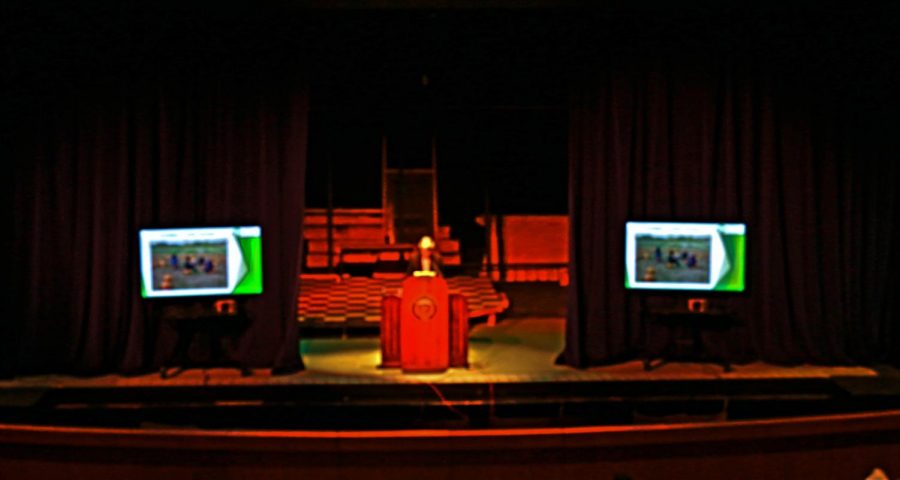Abolish Human Trafficking
April 3, 2019
“This is Founders Day. It is a day on which we recognize and celebrate those values that are foundational to who we aspire to be as a College of the Church. Essential to our United Church of Christ identity is our calling to work for justice. For us, this means becoming aware of situations and patterns of injustice within our world, nation, and our very own communities. It means sharing that awareness of injustice with others, advocating for equity and transformation, and helping those who have been harmed move towards healing and wholeness,” said Karl Kuhn at the opening Tuesday’s convocation.
Karl Kuhn, a professor of religion, opened the event by introducing Joan Dawber, founder and executive director of the Lifeway Network. Founded in 2007, the Lifeway Network plans to abolish human trafficking and “envisions a world in which every survivor is strong, connected and free.” Sr. Joan Dawber’s focus is “establishing safe housing for human trafficking survivors in the New York area and educating the general public on the important issues regarding modern day slavery.”
Human trafficking is defined as “a form of modern-day slavery in which traffickers use force, fraud, or coercion to control victims for the purpose of engaging in commercial sex acts or labor services against his/her will.” (Lifeway Network)
“I was deeply troubled to learn that my home town of Sheboygan could be the hub of sex trafficking in this state. It boggles my mind because we are ranked as the number one city to live in and raise a family just a couple of years ago,” said Sara Neumann, a junior here at Lakeland University.
“Just like anyone can be a victim, anyone can be a trafficker. We have seen traffickers in all categories: organized crime rings, diplomats, intimate partners, family, friends, employment or recruiting agencies, pimps, labor brokers, business owners, community & religious leaders, and sometimes even authority figures.” (Lifeway Network)
Dawber explained that the recent immigration laws have played a role in people being reluctant to come forward for help. There are many illegal immigrants that have been trafficked, many of whom fear of being deported if they came forward. Dawber also states that in most cases, the trafficker takes away the victim’s passports or visas, making him or her unable to escape or to go the authorities due to the risk of being classified as illegal.
“Hearing the story of how she got involved in this line of work was truly inspiring. Working with victims is never easy, especially when you hear all of the horrible things that are happening all around us,” said Madelynn Pfister, a junior at Lakeland University.
“Sadly, human trafficking is a reality, not only around the world, but right here in our communities. It is important that we are aware of this and learn how to recognize its presence in our midst. It is also important for us to discern how to best support those who have been victimized by human trafficking and help them return to healthy and whole lives in the community with others. It was a blessing to have Sr. Joan with us and to learn from her experience of ministering to human trafficking survivors,” Karl Kuhn said.
There will be another event on human trafficking led by Detective Tamara Remington of the Sheboygan Police Department on Wednesday, April 24, 2019 at Plymouth High School. The event will be from 6 p.m. to 8 p.m. For more information about Joan Dawber and the Lifeway Network organization, visit their website: lifewaynetwork.org
If you or someone you know is involved in human trafficking, “please call the National Human Trafficking Resource Center (NHTRC) at 1-888-373-7888 to anonymously report a tip. The hotline is available 24/7, in over 200 languages, and will connect you to the appropriate anti-trafficking services in your area”.



Thaddeus Gregory Blanchette • Apr 4, 2019 at 5:29 pm
Speaking as someone who has spent a good portion of his life in Sheboygan and is currently an anthropologist, living in Rio de Janeiro Brazil, a member of our state and federal anti-trafficking councils, please let me state with total and absolute certainty that you are being lied to.
Sheboygan is not a “hub of trafficking” in any sense of the word unless by “hub”, you mean “one case in every blue moon”.
Think about it people.
I am well aware of what the violence stats for Sheboygan are, as well as the prostitution and domestic violence stats. So you are SERIOUSLY telling us that the Sheboygan police are either so a) corrupt or, b) incompetent that they can’t spot dozens and dozens — nay, hundreds! — of people being spirited away by human traffickers from the midst of your very community?
Please.
Serious question: how many active missing persons cases with more than a week unsolved does the City of Sheboygan have on its books? You public officials who are pumping this particular moral panic in order to look like you are concerned can easily find out with a single phone call down to the Sheboygan Police.
So how about it, folks? What are the numbers?
Best wishes,
Dr. Thaddeus Gregory Blanchette